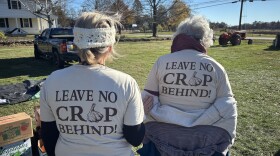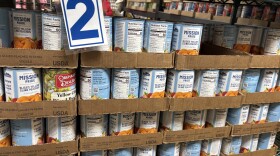Food insecurity is a persistent problem across the country, one that’s only increased during the pandemic. The New Hampshire Public Health Association estimates that roughly one in six households are food insecure in New Hampshire.
As people lost jobs and small businesses struggled, Indonesian Community Connect (ICC) in Somersworth scrambled to support New Hampshire’s Indonesian community. They connected residents in need with local food pantries, but some community members weren’t used to cooking with western staples like cheese and yogurt, and the ingredients ended up going bad in their kitchens instead.
Eventually, the ICC started working with Gather, a local organization fighting hunger on the Seacoast, and they created The Little Indonesia Food Pantry that specifically offers food in Indonesian residents’ diets.
“For example, instead of giving us bread, yogurt and cheese, they would give us jasmine rice or Chinese eggplants, things like that,” says Raude Raychel, the founder and president of Indonesian Community Connect.
Raychel joined NHPR Morning Edition host Rick Ganley to share how her organization was able to pivot and address food insecurity in the community.
Transcript:
Rick Ganley: The New Hampshire Public Health Association estimates that roughly one in six households are food insecure. How has the local Indonesian community been affected by food insecurity during the pandemic?
Raude Raychel: I think they have been heavily impacted by it, especially since the beginning of last year. The community is actually suffering from or heavily infected by this pandemic, and so we were trying to figure out what is it that we can do to help the communities based on their needs. So we were kind of shocked too, because we were not at the capacity of, you know, helping them other than connecting them with all the resources that we have in New Hampshire.
So we were able to do that, but there were also a lot of people that, you know, lost jobs or actually some of the businesses that are going through tough times where they were not able to apply for help. And it's been quite challenging for all of them.
Rick Ganley: I know you've partnered with Gather, the food pantry on the Seacoast, to provide more culturally relevant food for these residents. Can you tell me more about that and what that means?
Raude Raychel: Yes, Gather has been amazing to all of us because they were able to put together the types of food that are very common to our community.
For example, instead of giving us bread, yogurt and cheese, they would give us jasmine rice or Chinese eggplants, things like that, so that it can be very familiar to our community, whether from the younger generations to the elders. And it's going to be easier for them to kind of put [together] a meal based on the variety of those types of food that they gather.
So it was great for all of us to get that, and we find it very useful so that we don't waste anything that's being given because I think in the past year or so, we tried to kind of promote the different food pantries that's available out there. But we found it very challenging for our people and they ended up not using everything that's been given. So I think with this type of thing, it kind of worked out very well.
Rick Ganley: So you were able to adapt the pantry to the diet preferences of the community members that want to use it.
Raude Raychel: Yes, correct. So up to this point, we distribute food to 150 families or so, so around 300 to 350 people.
Rick Ganley: That's a lot of work, and I imagine it's pretty tough on staff. Tell me about your volunteers and the people that help you to do this.
Raude Raychel: So we are very limited. I mean, we are still a volunteer-based organization. We are really depending on the volunteers. And so sometimes, some weeks are very challenging, but some weeks we have some other people to call in and just say, "Hey, we'll be there for like a couple hours. We'll help you put up an assembly line and just kind of sort out the vegetables, the meat, the rice, the dry stuff, the fruits and all of that."
And [we'll work] together and then have a different team going to deliver or actually to distribute the following day on Saturdays. So it's a lot of work, especially for every two weeks, but there's another joy to it knowing that we are helping the community in any way that we can.








